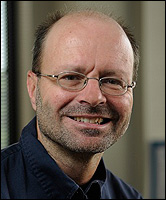A novel approach to improve location information to centimeter scale accuracy using the global positioning system has earned a Google Research Award for an engineering professor and his team.

The approach being developed by computer engineering associate professor Akos Ledeczi, graduate student Will Hedgecock, research scientist Peter Volgyesi, and visiting scholar, professor Miklos Maroti, uses GPS to derive relative location information for multiple receivers.
Vanderbilt engineering’s proposal – High-Precision Relative Localization of Smartphones – was one of six awards in the ‘mobile’ focus area, and the team was awarded $46,800.
GPS nodes in a wireless network share their raw satellite measurements and use this data to compute a series of pairwise ranges in addition to their own absolute coordinates. The goal of the research is to achieve centimeter scale accuracy for these relative locations. The research is also supported by a recent National Science Foundation grant.
This round, Google funded 104 awards – from 815 proposals – across 21 different focus areas for a total of nearly $6 million.
“GPS is marvelous technology providing accurate location information anywhere on Earth. GPS works by estimating the distances to multiple satellites based on measuring the time of flight of radio signals that travel at the speed of light. It is nothing short of amazing that the localization accuracy of GPS relying on low cost receivers such as smartphones is as good as a few meters,” Ledeczi said.
However, in applications such as the automated driving of cars or formation flying of unmanned air vehicles, more accuracy is required.
“It is more important to know the precise relative locations of devices than their absolute coordinates,” said Ledeczi, whose group also works on an acoustic countersniper application for smartphones, which is another example of where accurate relative locations are important.
Ledeczi’s main research focus is wireless sensor networks and he is a senior research scientist at the Institute for Software Integrated Systems (ISIS) at Vanderbilt.